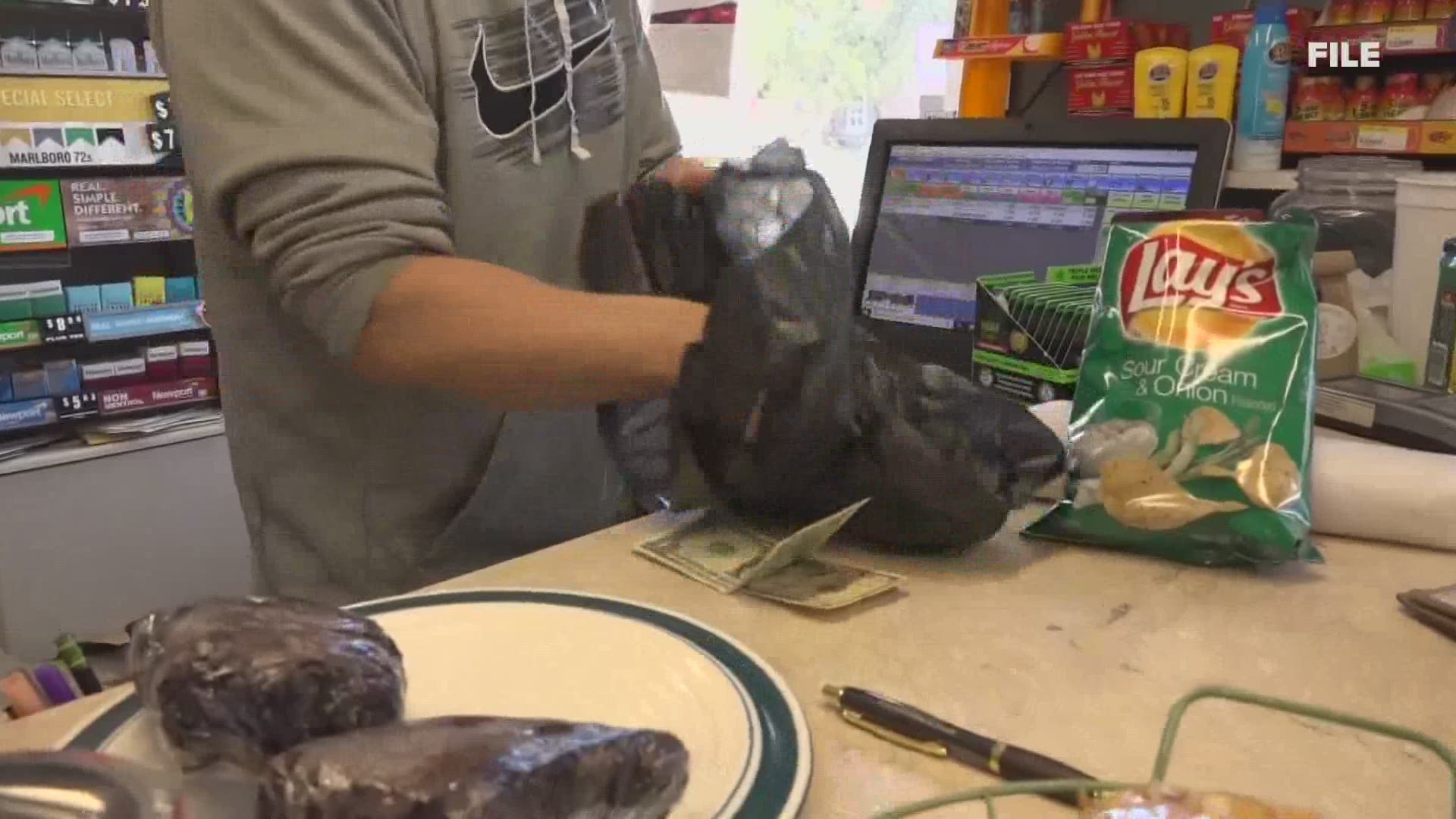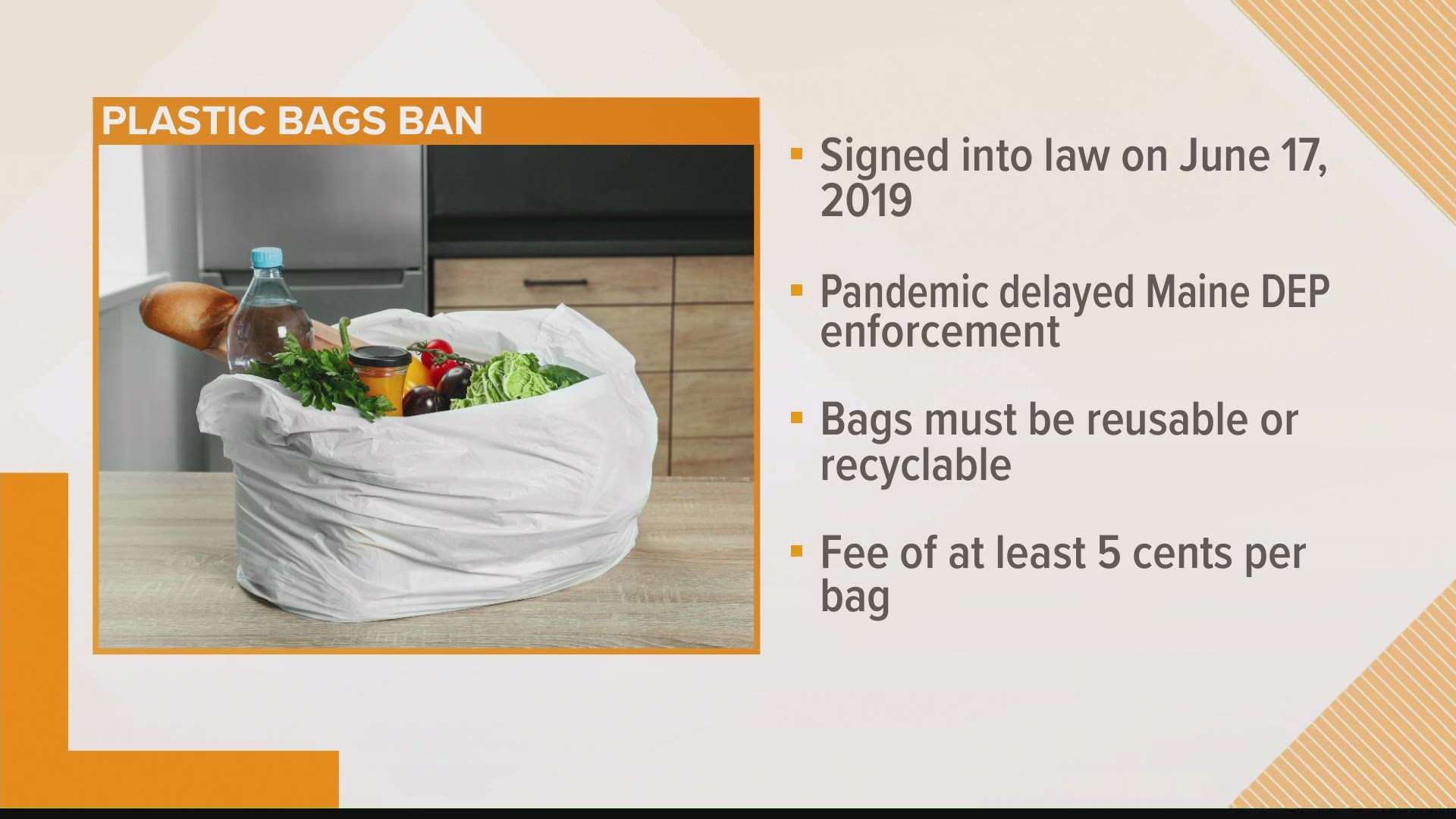BRUNSWICK, Maine — At the new Hannaford in Cook's Corner, a steady stream of customers file through the checkout lanes Wednesday afternoon. One noticeable difference: The brown plastic bags so many of us are used to seeing is supermarkets are nowhere to be found. Employees pack groceries into paper and reusable bags instead -- an indication of change in Maine.
As of July 1, two bans are going into effect, following delays brought on by the COVID-19 pandemic. In most cases, Maine retailers are no longer allowed to give out single-use plastic bags or polystyrene foam disposable food containers. As an alternative, retailers can offer customers fully-recyclable paper bags or thicker, plastic ones that can be used up to 75 times. Each carry-out bag costs customers at least five cents.
Gov. Janet Mills signed the bill banning plastic bags into law on June 17, 2019. That law went into effect in April of 2020, but the Maine Department of Environmental Protection delayed its enforcement because of challenges brought on by the pandemic. This ban applies to retail establishments, like stores and restaurants and temporary, seasonal, or pop-up businesses that sell food or other goods. Bags for produce, flowers, deli meat, bakery items, and fish from a pet store are still allowed, but a receptacle is required at establishments for take-back plastic bag recycling.
The statewide ban on polystyrene foam disposable food containers was supposed to take effect at the beginning of 2021, but it was also delayed because of the pandemic. In June, emergency legislation was passed that created a temporary exemption for polystyrene foam packaging for meat, poultry, fish, seafood, and eggs. That exemption will lift come July 1, 2025, but the goal is to give companies enough time to figure out other ways to package raw proteins. This ban doesn't apply to hunger programs that are fully funded by the Maine Department of Health and Human Services, like Meals on Wheels.
According to the National Conference of State Legislatures, eight states -- including California, Connecticut, Delaware, Hawaii, Maine, New York, Oregon, and Vermont -- have banned single-use plastic bags. That means in Hannaford's case, the adjustment to Maine's ban hasn't been too difficult, since stores in New York and Vermont have already been managing similar procedures.
"I think we all realize the importance of reducing plastic from our waste stream to help ensure a healthier planet," Ericka Dodge, the external communications manager for Hannaford Supermarkets, said, noting that when the Cook's Corner location opened a couple of weeks ago, plastic bags were not incorporated. She says signs are posted outside of Maine stores to remind customers to bring their reusable bags, and overhead messaging will play on the PA system. Any extra plastic bags will be donated to food banks and pantries.
At the six Governor's Restaurant and Bakery locations in Maine from Presque Isle to Lewiston, changes to adapt to these bans have been in the works for the past three to five months, according to owner Randy Wadleigh. He says the transition has been relatively smooth, but he has noticed that new materials cost a bit more -- and during the pandemic, there was a shortage of them.
That's one concern that Gregory Dugal has as the director of government operations for HospitalityMaine, since he works with a lot of restaurants and hotels.
"The supply chain is disrupted at this point for a lot of things and certainly for this kind of new packaging. It could be difficult to find the items that people are trying to get," Dugal said.
Megan Mansfield-Pryor, an environmental specialist with the Maine DEP, says plastic bags and polystyrene foam are among the top material found in little clean-ups, so the environmental impacts of bans like this are expected to be significant.
"Maybe one person stopping the use of polystyrene foam matters less, but if a number of states and all the people within those states start complying, then that's a lot of material that we're looking at," Mansfield-Pryor expressed.
Christine Cummings with the Maine Grocers and Food Producers Association says more than 20 municipalities already had plastic bag bans or polystyrene bans in place before these statewide policies. She says these changes are expected to impact stores in rural communities and northern Maine more.
Click here to read more about the plastic bags or polystyrene foam bans.


